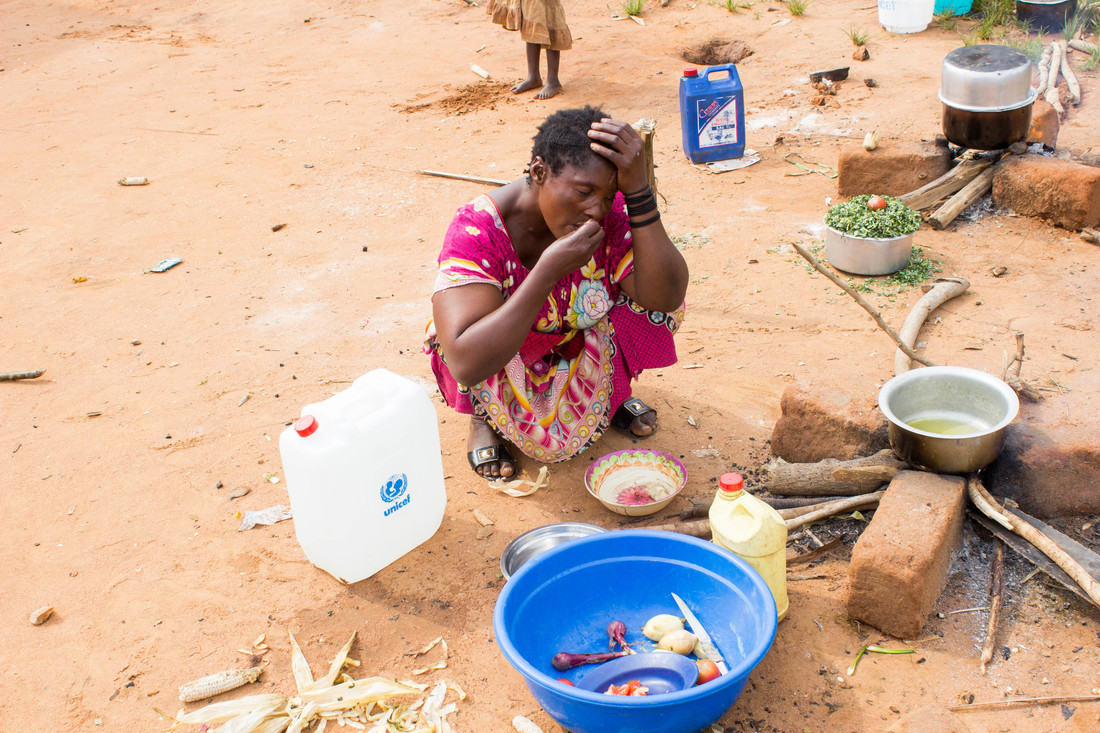In January, the Start Fund was alerted to its 214th crisis in Burundi where there has been an influx of refugees arriving from the Democratic Republic of Congo (DRC). Increased violence between armed groups and government forces in the DRC has forced thousands of people to flee to neighboring countries. According to the Burundian authorities, 6,934 Congolese refugees had crossed Lake Tanganyika from the DRC into Burundi (as of the 28th January 2018).
Start Network member, Care International was one of the agencies awarded Start Funds to provide a rapid respond to the needs of the displaced people who were arriving in Burundi. Care International has speaking to some of the families who have arrived in Burundi to hear their story.
Anna, a Congolese refugee in Burundi. © Ninon Ndayikengurukiye
“I am worried I will not be able to breastfeed my baby,” says Anna, mother of little Lexige. Lexige was born only a few days ago. His home is a refugee camp in the South-West of Burundi. His family fled the DRC after rockets were launched on their homes and fields. Lexige and his family belong to an ethnic group that are currently being targeted by armed groups in the DRC. Crossing Lake Tanganyika by boat, they arrived at the refugee camp almost two weeks ago.
“We can’t afford eating two times a day,” says Enock, Lexige’s father.
“We eat once a day and we don’t have kitchen utensils. We borrow between ourselves and sometimes we have to take turns to eat.”
“Matthew is crying because he is hungry. The last time he ate was yesterday afternoon at 3.00pm. Now, one day later, at 3.15 pm, he still has not eaten.”
CARE and other humanitarian agencies are supporting family’s like Lexige’s. CARE has distributed dignity kits including hygiene pads for women and babies, as well as mats, blankets and other important household items. But the level of support is not matching the staggering needs.
To ensure aid agencies’ assistance matches refugees’ needs, CARE International has worked with camp residents to establish a committee consisting of 3 women, 3 men, 2 girls and 2 boys. Residents submit their issues to the committee which is responsible for ensuring proper follow up.
Lexige’s family consists of his parents, his sibling, and both his grandmothers, all crammed into a small tent. Enock explains their sleeping arrangements,
“I feel ashamed to sleep with my mother-in-law and my mother together with my wife and my kids… I look for another place to sleep at night.”
Lexige’s family is one of many, all of them struggling. Jeanne, aged 20, is nine months pregnant. She and her husband fled their home in DRC with their small child. Since arriving 24 hours earlier, Jeanne has been unable to eat.
Life of DRC refugees Makombe © Ninon Ndayikengurukiye
“Refugees here are very kind. From the little they have, they welcomed me. Now, please help me, I want to deliver well my baby even if I am not in my country,” says Jeanne.
Some families, like Amisi’s, were separated as they fled the turmoil in their villages.
“I don’t know if my husband is still alive. There is a possibility that he was killed”
“When we arrived in the camp one of my children fell sick with malaria. When I came back from the doctor, my other three children had been transferred to another camp. I am still waiting to be able to join them there. Now, I can’t sleep. I think about my children sick in another site where I don’t have access to see them,” continues Amisi.
A surge in violent conflict and tensions in DRC has forced more than 5 million Congolese from their homes, over 670,000 are currently seeking refuge in neighboring countries, reported UNHCR. Since 24 January 2018, more than 8,000 Congolese have made the crossing into South West Burundi. Most of them have been transferred in camps, waiting for a future that is far from certain.
Start Fund projects are selected and activated within 72 hours of an alert, making it the fastest, collectively-owned early response mechanism in the world. The Start Fund enables members to respond quickly to crises that would traditionally slip under the radar of the traditional humanitarian response. Care Internationals response in Burundi is predicted to reach 10,673 people and will end on the 20th March.
670,000 Congolese are seeking refuge in neighboring countries © Ninon Ndayikengurukiye
Read about the Start Networks response in the Democratic Republic of Congo

